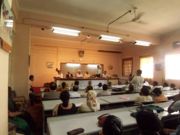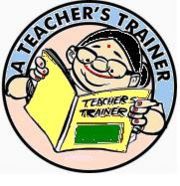PANEL DISCUSSION
LET US KNOW ABOUT PANEL DISCUSSION
This section deals with the panel discussion, which is used by a trainer in a training programme.
|
A series of questions on panel discussion as a mode of transaction has been asked and the answers given. Together, they form the content of panel discussion. |
|
What is a panel discussion? A panel of experts is set up to discuss a topic that cannot be easily resolved by just one or two persons. |
Who takes part in a panel discussion?
There are three sets of participants in a panel disucssion.
They are :
- The panel members who consist of experts in the field concerned.
- The audience of selected students/trainees/participants and teachers. who ask questions of the panellist.
- The moderator who initiates the discussion, questions, synthesizes and summarizes the key points.
The word ‘panel’ means a group of experts. The discussion held among these expert members in front of an audience could be called panel discussion.
The panel would change from subject to subject, but there would be an anchor person, who would introduce the panelists, receive questions and distribute them to the panelists upon their specialization..
The panel for a topic ‘ The effect of housework on children’ may include a child specialist, a child psychologist, a teacher, an educational administrator and a journalist.
| Send the Completed Activity Sheet to:
bhatvd@yahoo.co.in |
|
What topics can be taken up for panel discussion?
When the theme or topic tends to be complicated and controversial in nature, a panel discussion often helps to clarify issues. The difficult aspects of the topic are considered in a systematic and objective manner.
How is a panel discussion set up?
- Experts in the field are invited as panelists.
- There is an invited audience of trainers and trainees or teachers and students.
- Questions on the proposed topic are collected in advance from the audience and handed over to the panelists
- Questions are generally classified according to the sub-topic/ aspect/ dimension of the proposed theme. The panelists come prepared to the panel discussion.
How is a panel discussion conducted?
- The moderator introduces the theme of the discussion to the participants. The moderator also initiates the discussion on the issue under consideration.
- The questions are then addressed to the panelists in a pre-determined order.
- The panelists are called (in a pre-determined order) to express their views
- Later, panel members may react to, respond to or complement the views expressed by co-panelists.
- At the end of the session, the moderator integrates and synthesizes the different points of view and presents them to the audience.
- If there is time, the moderator can call for further questions
- Finally, the moderator sums up the discussion and highlights the key points.
![]() What are the advantages of a panel discussion?
What are the advantages of a panel discussion?
- It facilitates clarification on knotty issues.
- It highlights the multi-dimensionality of the issue under discussion.
- It helps to develop critical thinking in both panelists and the audience
- It fosters logical thinking
- It develops presentation skills.
- It teaches students to think of the issues under consideration and ask relevant questions.
| Send the Completed Activity Sheet to:
bhatvd@yahoo.co.in |
|
|
1 Watch a panel discussion on the TV and make notes If you were attending a panel discussion on Universalisation of Elementary Education as the audience, what questions would you ask? List out the questions. 2 Visit the following links and find out other ways of conducting panel discussion. http://www.historians.org/Projects/GIroundtable/Discussion http://www.historians.org/Projects/GIroundtable/Discussion/Discussion4_2.htm http://www.historians.org/Projects/GIroundtable/Discussion/Discussion4_5.htm http://www.historians.org/Projects/GIroundtable/Discussion/Discussion4_1.htm http://www.historians.org/Projects/GIroundtable/Discussion/Discussion4.htm 3 Discuss among your colleagues and reason out as to why there should be panelists of different backgrounds. 4 Conduct panel discussion with your teacher trainees as the audience and record your experiences. Please make arrangement s for recording the discussion and the question and answer session by a stenographer or tape record the whole event. Hold a discussion with your teacher trainees as to how it could be improved. 5 Discuss with your colleagues and develop a set of criterion for assessing the panel discussion.
|

